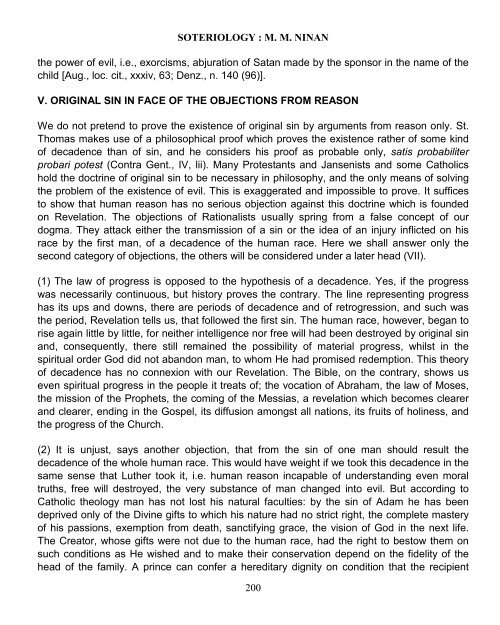Theodicy Soteriology, Hermeneutics
Create successful ePaper yourself
Turn your PDF publications into a flip-book with our unique Google optimized e-Paper software.
SOTERIOLOGY : M. M. NINAN<br />
the power of evil, i.e., exorcisms, abjuration of Satan made by the sponsor in the name of the<br />
child [Aug., loc. cit., xxxiv, 63; Denz., n. 140 (96)].<br />
V. ORIGINAL SIN IN FACE OF THE OBJECTIONS FROM REASON<br />
We do not pretend to prove the existence of original sin by arguments from reason only. St.<br />
Thomas makes use of a philosophical proof which proves the existence rather of some kind<br />
of decadence than of sin, and he considers his proof as probable only, satis probabiliter<br />
probari potest (Contra Gent., IV, lii). Many Protestants and Jansenists and some Catholics<br />
hold the doctrine of original sin to be necessary in philosophy, and the only means of solving<br />
the problem of the existence of evil. This is exaggerated and impossible to prove. It suffices<br />
to show that human reason has no serious objection against this doctrine which is founded<br />
on Revelation. The objections of Rationalists usually spring from a false concept of our<br />
dogma. They attack either the transmission of a sin or the idea of an injury inflicted on his<br />
race by the first man, of a decadence of the human race. Here we shall answer only the<br />
second category of objections, the others will be considered under a later head (VII).<br />
(1) The law of progress is opposed to the hypothesis of a decadence. Yes, if the progress<br />
was necessarily continuous, but history proves the contrary. The line representing progress<br />
has its ups and downs, there are periods of decadence and of retrogression, and such was<br />
the period, Revelation tells us, that followed the first sin. The human race, however, began to<br />
rise again little by little, for neither intelligence nor free will had been destroyed by original sin<br />
and, consequently, there still remained the possibility of material progress, whilst in the<br />
spiritual order God did not abandon man, to whom He had promised redemption. This theory<br />
of decadence has no connexion with our Revelation. The Bible, on the contrary, shows us<br />
even spiritual progress in the people it treats of; the vocation of Abraham, the law of Moses,<br />
the mission of the Prophets, the coming of the Messias, a revelation which becomes clearer<br />
and clearer, ending in the Gospel, its diffusion amongst all nations, its fruits of holiness, and<br />
the progress of the Church.<br />
(2) It is unjust, says another objection, that from the sin of one man should result the<br />
decadence of the whole human race. This would have weight if we took this decadence in the<br />
same sense that Luther took it, i.e. human reason incapable of understanding even moral<br />
truths, free will destroyed, the very substance of man changed into evil. But according to<br />
Catholic theology man has not lost his natural faculties: by the sin of Adam he has been<br />
deprived only of the Divine gifts to which his nature had no strict right, the complete mastery<br />
of his passions, exemption from death, sanctifying grace, the vision of God in the next life.<br />
The Creator, whose gifts were not due to the human race, had the right to bestow them on<br />
such conditions as He wished and to make their conservation depend on the fidelity of the<br />
head of the family. A prince can confer a hereditary dignity on condition that the recipient<br />
200


















